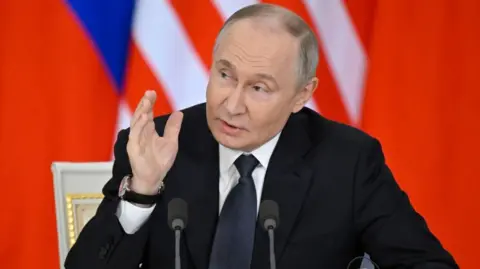### Putin’s Withdrawal from Expected Peace Talks in Turkey
In a significant development regarding the ongoing conflict between Russia and Ukraine, Russian President Vladimir Putin has announced that he will not attend the scheduled peace talks in Turkey, despite Ukrainian President Volodymyr Zelensky’s pleas for him to take part. The discussions, taking place in Istanbul on Thursday, will be led by Kremlin aide Vladimir Medinsky, as confirmed by an official statement from the Russian government.
President Zelensky, who had extended an invitation to Putin, expressed his willingness to engage directly in discussions if the Russian leader agreed to the meeting. Notably, Zelensky has underscored his commitment to facilitating face-to-face negotiations, showcasing a desire for direct engagement to potentially resolve the protracted conflict.
The significance of these talks is underscored by Zelensky’s planned attendance in Ankara, where he is expected to meet Turkish President Recep Tayyip Erdogan. This indicates that Turkey continues to play a crucial mediating role in the conflict, emphasizing its geopolitical significance in the region as a facilitator of dialogue between the two nations.
The absence of a direct meeting between Putin and Zelensky is notable, particularly since their last personal encounter dates back to December 2019. Furthermore, the last formal negotiations between Russia and Ukraine occurred in March 2022 in Istanbul, shortly after Russia’s comprehensive invasion of Ukraine began, marking a critical point in their bilateral relations.
Since the invasion, hostilities have intensified, with Russian forces steadily gaining control over varying territories, especially in the eastern regions of Ukraine. The continuation of fighting reflects the complexities surrounding dialogue that emerged so long after their last discussions.
Originally, Putin had advocated for direct negotiations in Turkey without preconditions, suggesting a willingness to talk. However, as the framework for these forthcoming talks developed, both Putin and Zelensky appeared poised for direct engagement, only for Putin to retract his participation suddenly. This withdrawal could have significant implications for peace efforts and raises questions about Russia’s strategy moving forward.
Adding another layer of complexity, former U.S. President Donald Trump publicly floated the idea of participating in the talks if Putin were to attend. Speaking to reporters while in Qatar, Trump mentioned that he was uncertain whether Putin would attend if he wasn’t present but indicated a keen interest in assisting in brokering a resolution to the ongoing war. Trump’s assertion that he knows Putin would like his involvement suggests a unique positioning of the U.S. regarding the conflict, involving a high-profile diplomatic player with ambitions of influencing peace discussions.
In light of Trump’s potential involvement, it is also noteworthy that the U.S. plans to send a high-ranking delegation to the Istanbul talks, which will include prominent diplomats like Marco Rubio. This underlines the U.S. interest in the proceedings and its commitment to attempting to mediate an end to the hostilities between Russia and Ukraine.
As the situation unfolds, the global community remains focused on the outcomes of the discussions in Turkey, recognizing the importance of diplomatic efforts in mitigating one of the most pressing geopolitical crises in recent history. The talks could yield crucial insights and potential pathways towards establishing a ceasefire or at the very least, a framework for future negotiations.
In summary, Putin’s decision to abstain from the Turkey talks signals a complex and evolving landscape in the Russian-Ukrainian conflict, where diplomatic engagements continue to be vital yet challenging. As the role of other international actors, such as the U.S. and Turkey, becomes increasingly prominent, the world watches closely to see if any progress can be made towards peace. The intricate interplay of diplomacy, national interests, and the realities of warfare presents an ongoing struggle for all involved parties as they seek to alter the current trajectory of this tragic and enduring conflict.



